Nurses Narratives Staff Nurse Beatrice Annie Coves
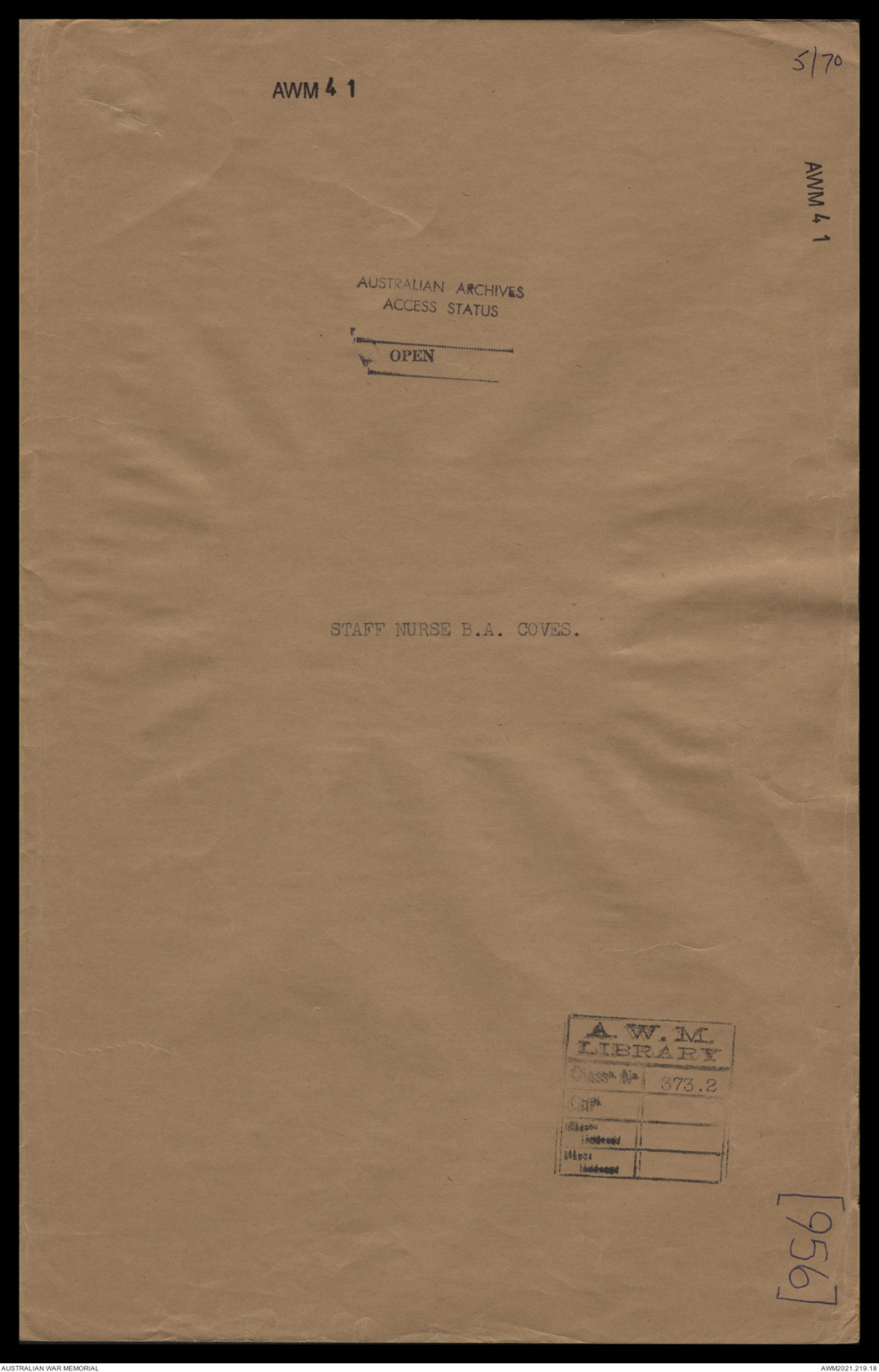
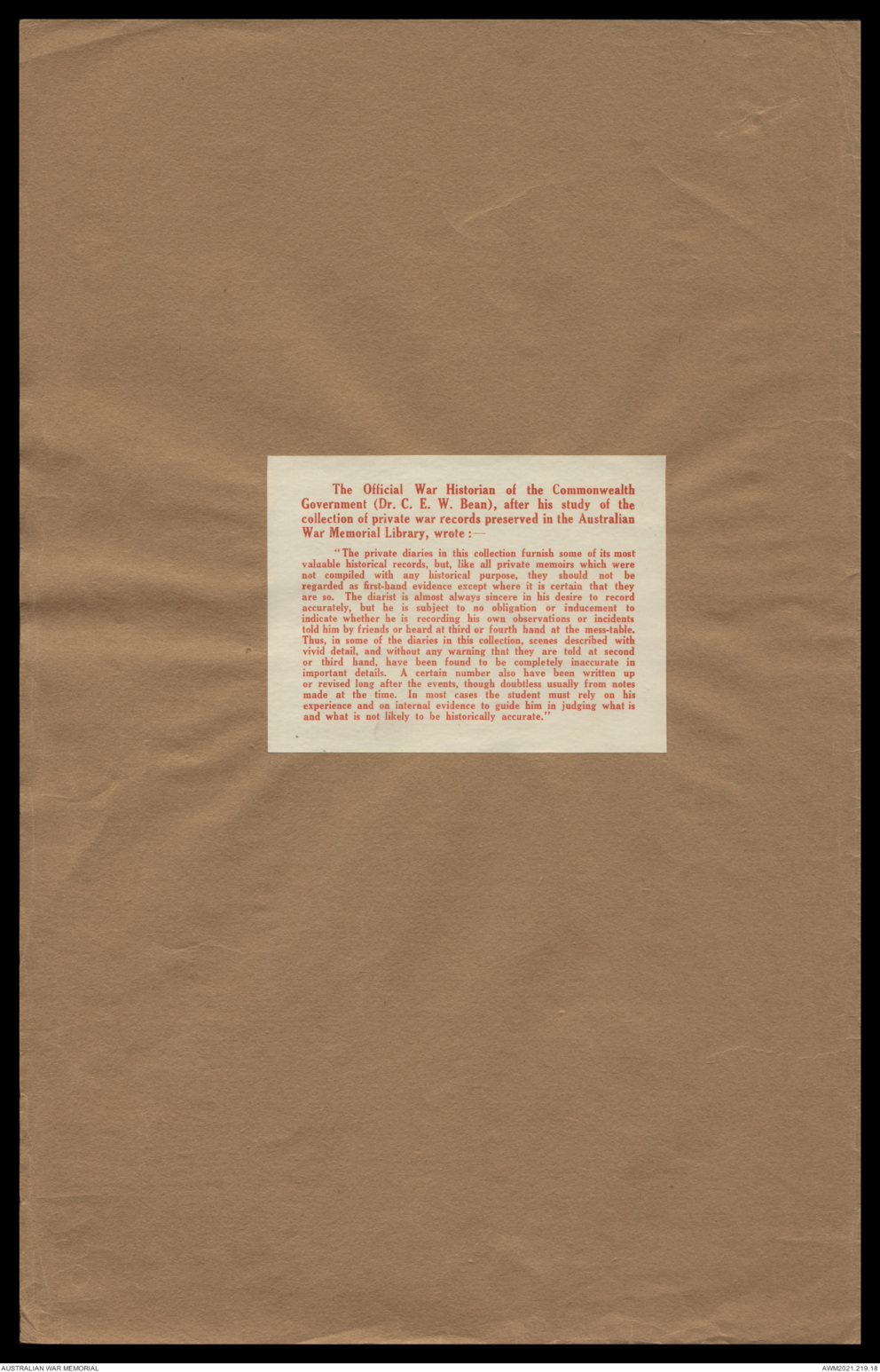
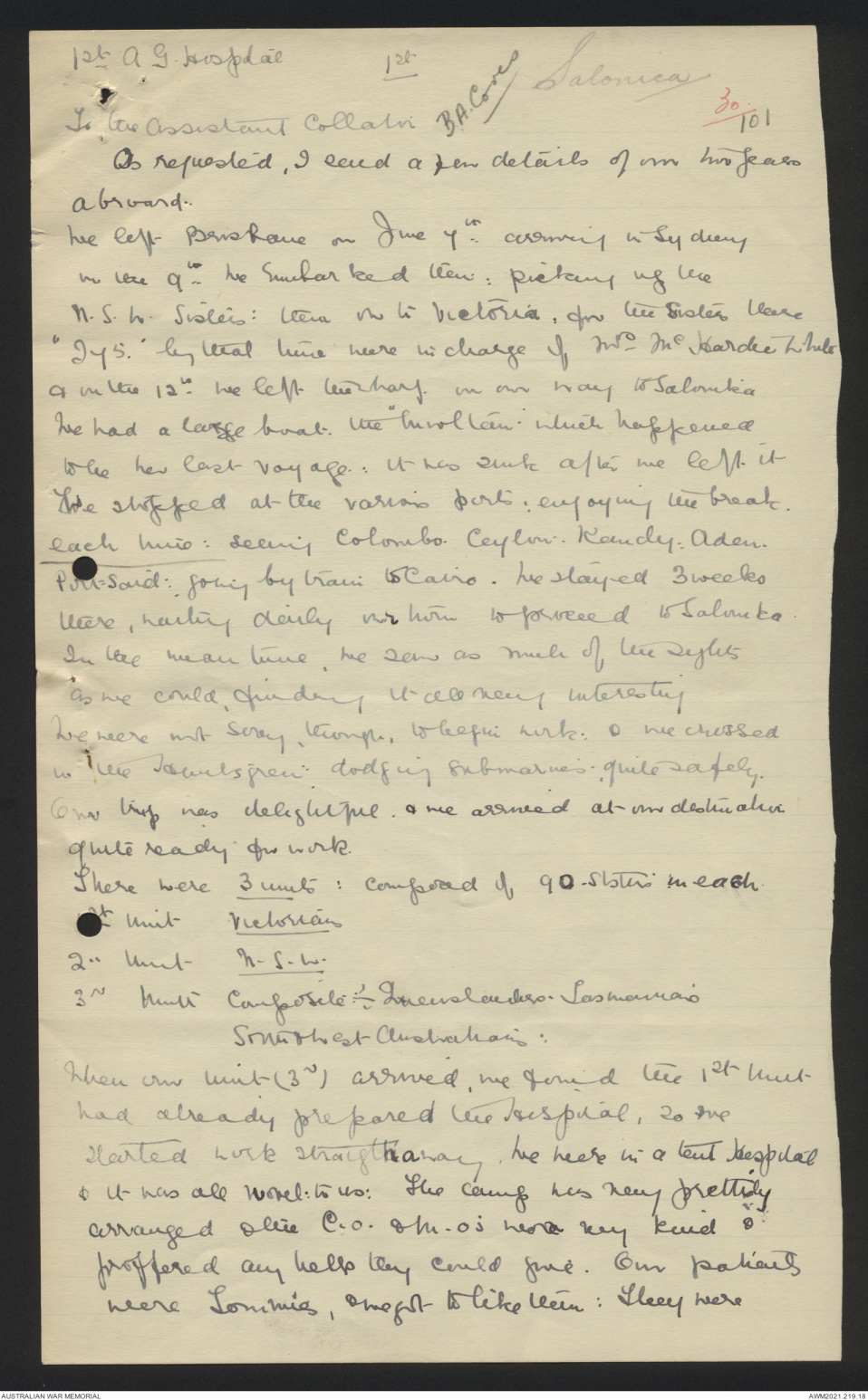
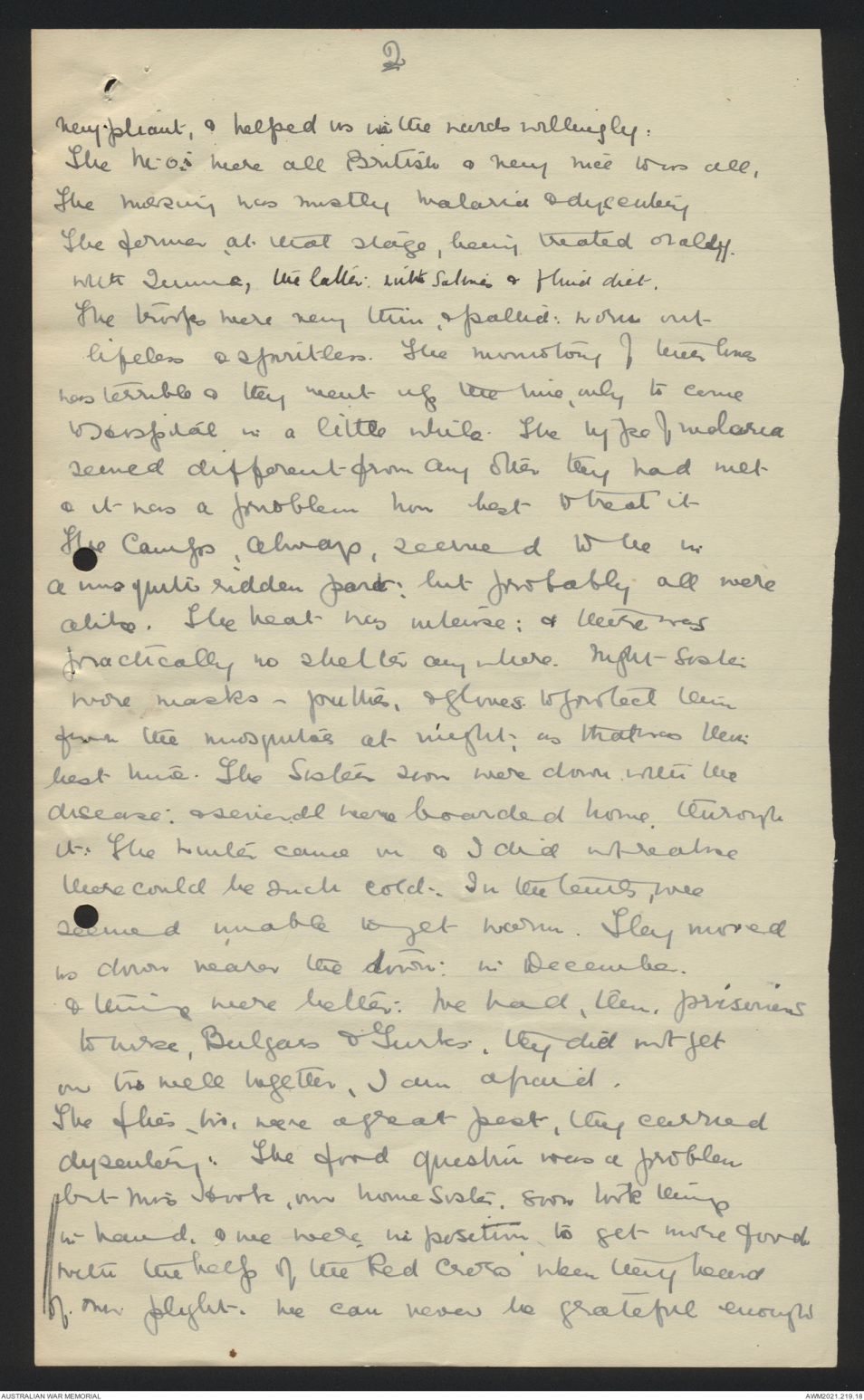
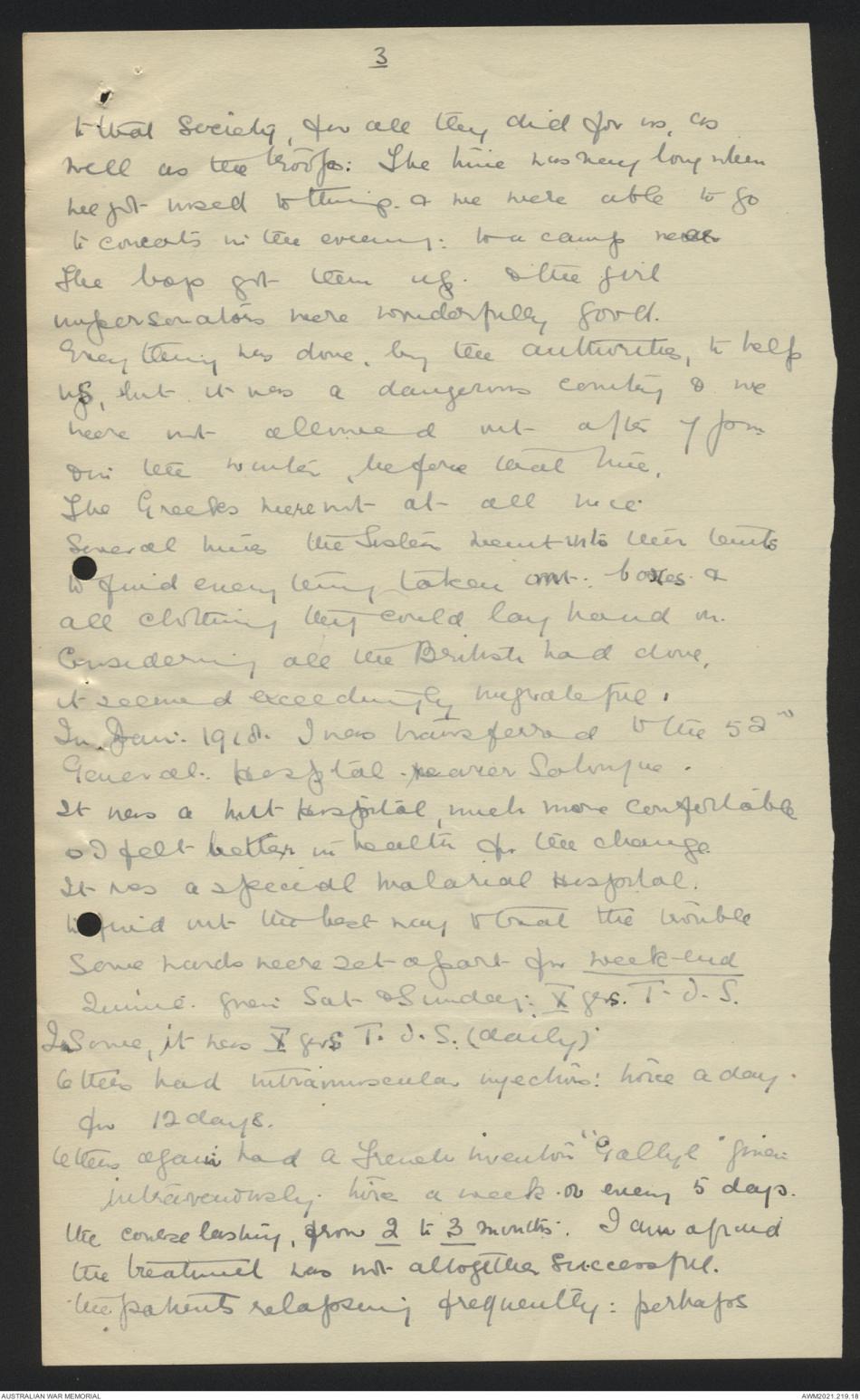
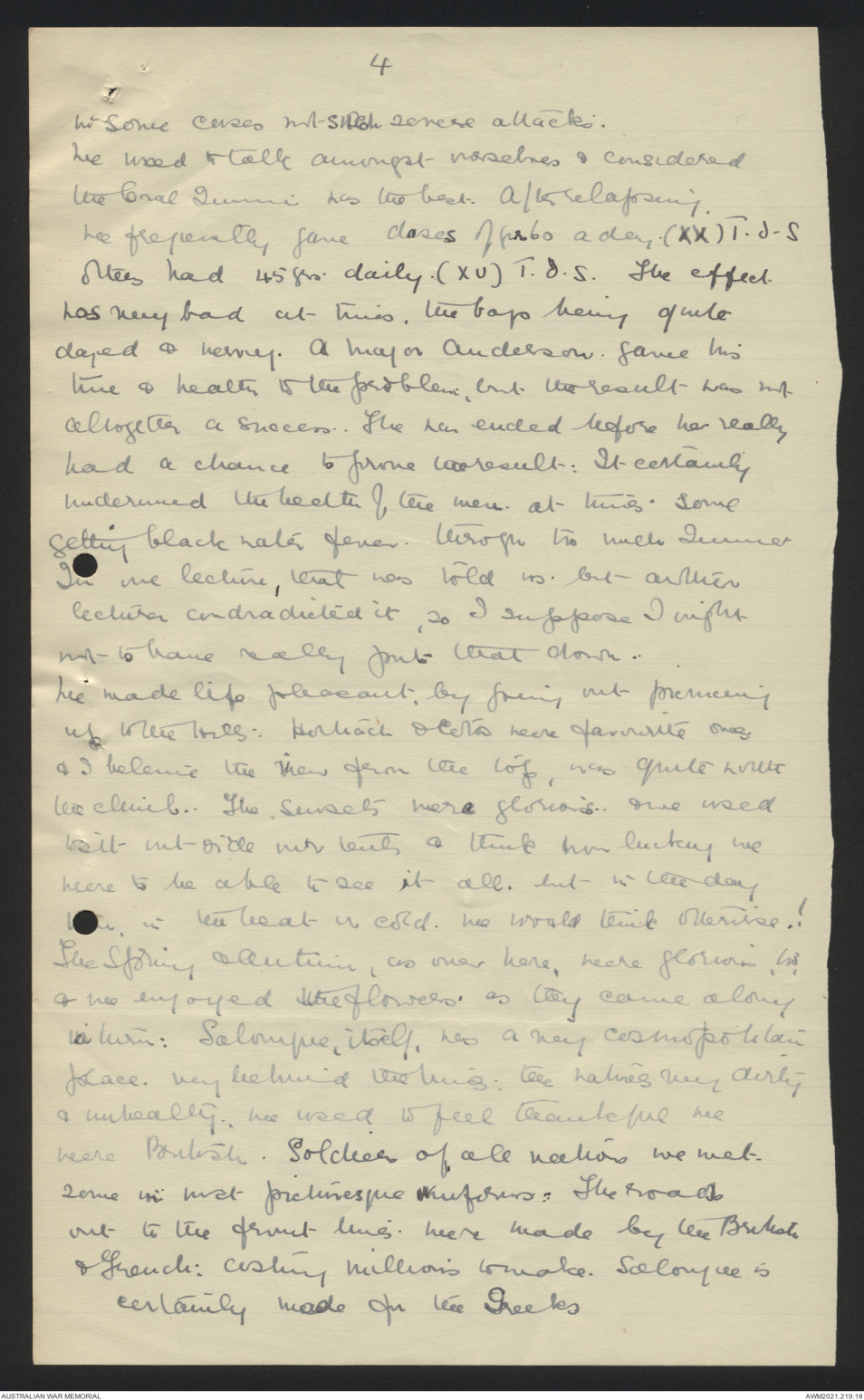
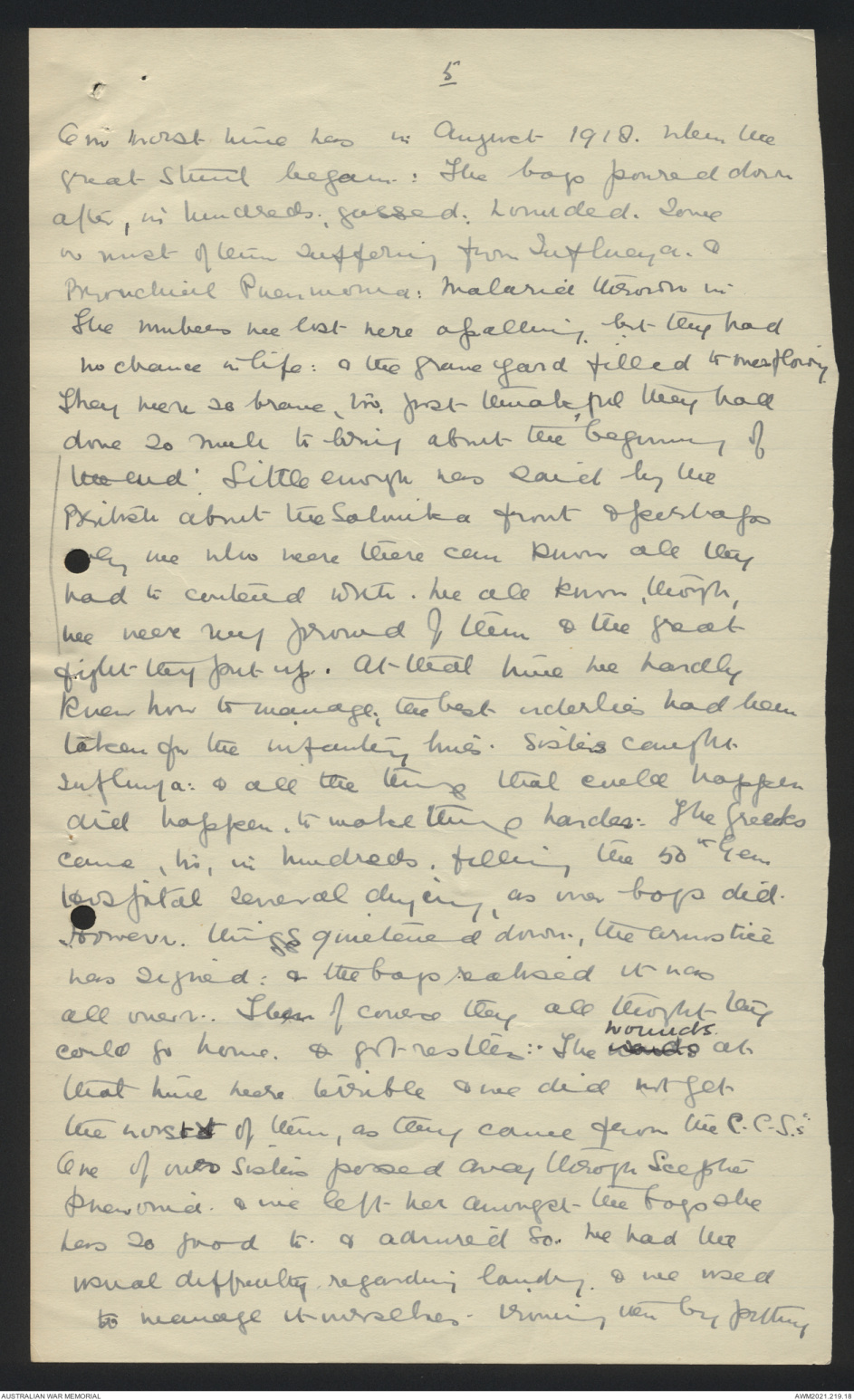
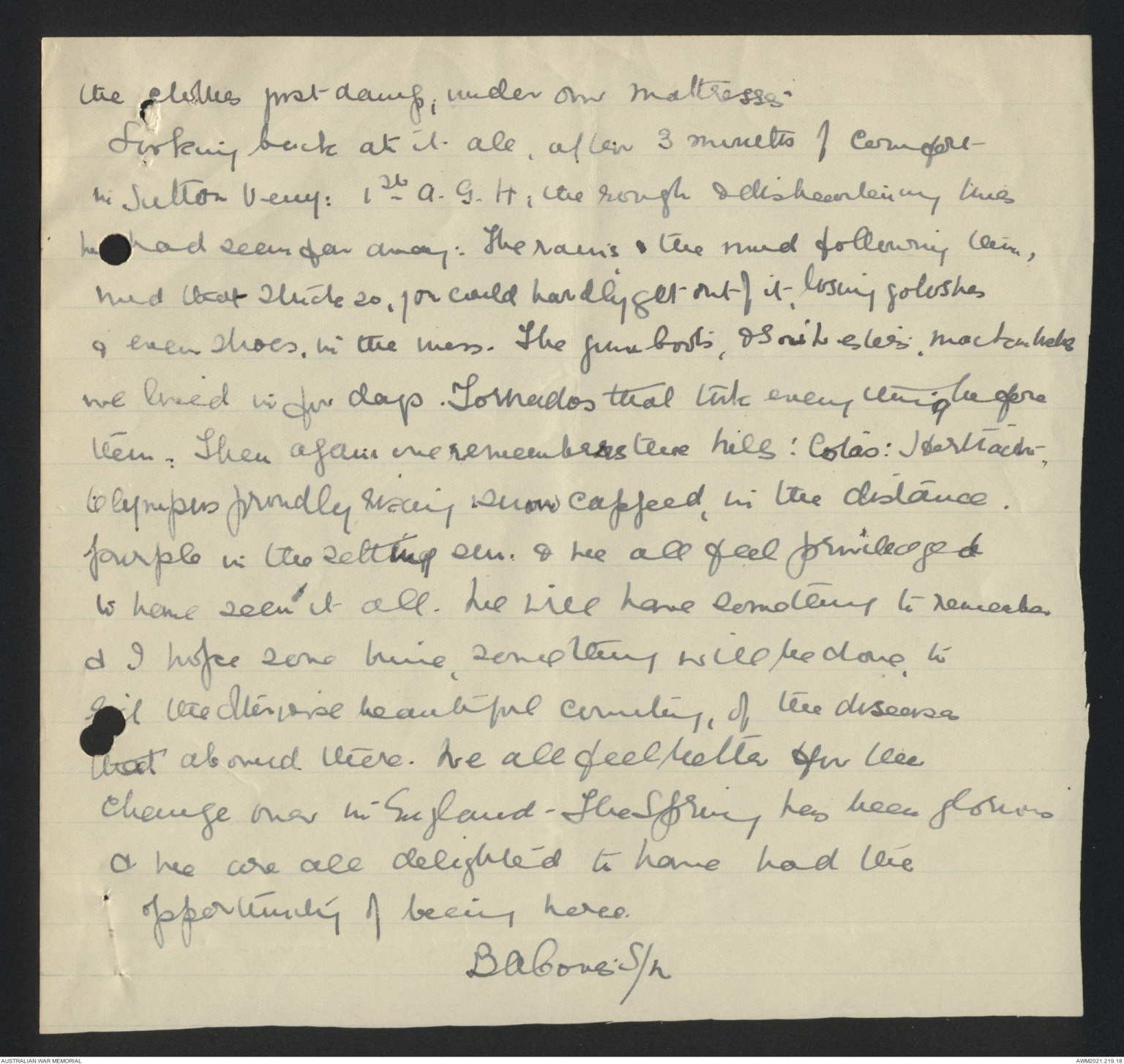
AWM 4 1 5/70
AUSTRALIAN ARCHIVES
ACCESS STATUS
OPEN
STAFF NURSE B.A. COVES.
[956]
The Official War Historian of the Commonwealth
Government (Dr. C. E. W. Bean), after his study of the
collection of private war records preserved in the Australian
War Memorial Library, wrote:-
"The private diaries in this collection furnish some of its most
valuable historical records, but, like all private memoirs which were
not compiled with any historical purpose, they should not be
regarded as first-hand evidence except where it is certain that they
are so. The diarist is almost always sincere in his desire to record
accurately, but he is subject to no obligation or inducement to
indicate whether he is recording his own observations or incidents
told him by friends or heard at third or fourth hand at the mess-table.
Thus, in some of the diaries in this collection, scenes described with
vivid detail, and without any warning that they are told at second
or third hand, have been found to be completely inaccurate in
important details. A certain number also have been written up
or revised long after the events, though doubtless usually from notes
made at the time. In most cases the student must rely on his
experience and on internal evidence to guide him in judging what is
and what is not likely to be historically accurate".
1st A G. Hospital
1st
Salonica
B.A. Coves
30/101
To the Assistant [[Collater]]
As requested, I send a few details of our two years
abroard.
We left Brisbane on June 7th, arriving in Sydney
on the 9th. We embarked then: picking up the
NSW Sisters: then on to Victoria, for the Sisters
[["JY5" ?]] by that time were in charge of Mrs McHardie White
& on the 12th. We left the wharf on our way to Salonika
We had a large boat. The "Mooltan" which happened
to be her last voyage. It was sunk after we left it.
We stopped at the various ports: enjoying the break
each time: seeing Colombo, Ceylon, Kandy, Aden,
Port Said: going by train to Cairo. We stayed 3 weeks
there, waiting daily for how to proceed to Salonika.
In the meantime, we saw as much of the sights
as we could, finding it all very interesting
We were not sorry, though, to begin work & we crossed
to the [[?]]: dodging submarines quite safely.
Our trip was delightful & we arrived at our destination
quite ready for work.
There were 3 units: composed of 90 Sisters in each
1st Unit Victorians
2nd Unit N.S.W
3rd Unit Composite:- Queenslanders, Tasmanians
South & West Australians.
When our unit (3rd) arrived, we found the 1st Unit
had already prepared the Hospital, so we
started work straightaway. We were in a tent Hospital
& it was all novel to us: The camp was very prettily
arranged & the C.O. & M.O's were very kind &
proffered any help they could give. Our patients
were Tommies, one got to like them: They were
2
very pliant, & helped us in the wards willingly.
The M.O.s were all British & very nice to us all.
The nursing was mostly malaria & dysentery
The former at that stage, being treated orally
with Quinine, the latter : with saline & fluid diet.
The troops were very thin, & pallid: worn out
lifeless & spiritless. The monotony of these times
was terrible & they went up the line, only to come
to hospital in a little while. The type of malaria
seemed different from any other they had met
& it was a problem how best to treat it.
The Camps, always, seemed to be in
a mosquito ridden part: but probably all were
alike. The heat was intense; & there was
practically no shelter anywhere. Night-Sisters
wore masks - puttees, & gloves to protect them
from the mosquitos at night as that was their
best time. The Sisters soon were down with the
disease: & several were boarded home through
it. The winter came in & I did not realise
there could be such cold. In the tents, we
seemed unable to get warm. They moved
us down nearer the town: in December
& things were better: We had, then, prisoners
to nurse, Bulgars & Turks, they did not get
on too well together, I am afraid.
The flies, too, were a great pest, they carried
dysentery: The food question was a problem
but Mrs Hook, our home Sister, soon took things
in hand, & we were in position to get more food
with the help of the Red Cross when they heard
of our plight. We can never be grateful enough
3
to that Society, for all they did for us, as
well as the troops: The time was very long when
we got used to things & we were able to go
to concerts in the evening: to a camp near.
The boys got them up, & the girl
impersonators were wonderfully good.
Every thing was done, by the authorities, to help
us, but it was a dangerous country & we
were not allowed out after 7 pm
& in late winter, before that time.
The Greeks were not at all nice.
Several times the Sisters went into their tents
to find every thing taken out: boxes &
all clothing they could lay hand on.
Considering all the British had done,
it seemed exceedingly ungrateful.
In Jan. 1918, I was transferred to the 52nd
General Hospital nearer Salonique.
It was a hut Hospital, much more comfortable
& I felt better in health for the change.
It was a special Malarial Hospital.
[[to?]] find out the best way to treat the trouble
Some wards were set apart for week-end
Quinine from Sat & Sunday: X grs. T.d.S.
In some, it was X grs T.d.S. (daily)
Others had intramuscular injections: twice a day
for 12 days.
Others again had a French invention "Gallyl" given
intravenously twice a week. or every 5 days.
the course lasting, from 2 to 3 months. I am afraid
the treatment was not altogether successful,
the patients relapsing frequently: perhaps
4
in some cases not such severe attacks.
We used to talk amongst ourselves & considered
the Oral Quinine was the best. After relapsing
we frequently gave doses of grs60 a day (XX) T.d.S
others had 45grs. daily. (XU) T.d.S. The effect
was very bad at times. The boys being quite
doped & nervey. A Major Anderson gave his
time & health to the problem, but the result was not
altogether a success. The war ended before he really
had a chance to prove the result: It certainly
undermined the health of the men at times. Some
getting black water fever through too much Quinine
In the lecture, that was told us. but another
lecturer contradicted it, so I suppose I ought
not to have really put that down.
We made life pleasant, by going out primarily
up to the hills. Hortiach & Cotos were favourite ones,
& I believe the view from the top was quite worth
the climb. The sunsets were glorious & we used
to sit outside our tents & think how lucky we
were to be able to see it all, but in the day
time in the heat & cold. We would think otherwise.!
The Spring & Autumn, as over here, were glorious too,
& we enjoyed the flowers as they came along
in turn: Salonique itself, was a very cosmopolitan
place. Very behind the times. The natives very dirty
& unhealthy. We used to feel thankful we
were British. Soldiers of all nations we met,
some in most picturesque uniforms. The roads
out to the front lines were made by the British
& French costing millions to make. Salonique is
certainly made for the Greeks
5
Our worse time was in August 1918. When the
great stand began. The boys poured down
after, in hundreds; gassed. wounded. Some
of worst of them suffering from Influenza, &
Bronchial Pneumonia: Malaria thrown in.
The numbers we lost were appalling but they had
no chance in life: & the graveyard filled to overflowing
They were so brave, I'm just thankful they had
done so much to bring about the beginning of
the end. Little enough was said by the
British about the Salonika front & perhaps
only we who were there can know all they
had to contend with. We all know, though,
we were very proud of them & the great
fight they put up. At that time we hardly
knew how to manage, the best orderlies had been
taken for the infantry lines. Sisters caught
Influenza: & all the things that could happen
did happen to make thing harder. The Greeks
came, [[in]] , in hundreds, filling the 50th Gen
Hospital several dying, as our boys did.
However, things quietened down, the armistice
was signed. & the boys realised it was
all over. Then of course they all thought they
could go home & got restless: The wounds at
that time were terrible & we did not get
the worst of them, as thy came from the C.C.S.'s
One of our sisters passed away through Sceptic
pneumonia & we left her amongst the boys she
was so good to & admired so. We had the
usual difficulty regarding laundry & we used
to manage it ourselves, ironing them by putting
the clothes just damp under our mattress.
Looking back at it all, after 3 months of comfort
in Sutton Veny. 1st-A.G.H, the rough & disheartening times
here had seem far away. The rains & the mud following them,
mud that stuck so, you could hardly get out of it, losing goloshes
& even shoes, in the mess. The gumboots, & [[ srhiesles, macintoshes?]]
we lived in for days. Tornados that take every thing before
them. Then again one remembers these hills: Cotos : Hortiach -
Olympus proudly [[?]] snow capped in the distance.
Purple in the setting sun. & we all feel privileged
to have seen it all. We will have something to remember
& I hope some time, something will be done to
rid the otherwise beautiful country, of the diseases
that abound there. We all feel better for the
change over in England - The Spring has been glorious
& we are all delighted to have had the
opportunity of being here.
BACoves S/n
 Jacqueline Kennedy
Jacqueline KennedyThis transcription item is now locked to you for editing. To release the lock either Save your changes or Cancel.
This lock will be automatically released after 60 minutes of inactivity.